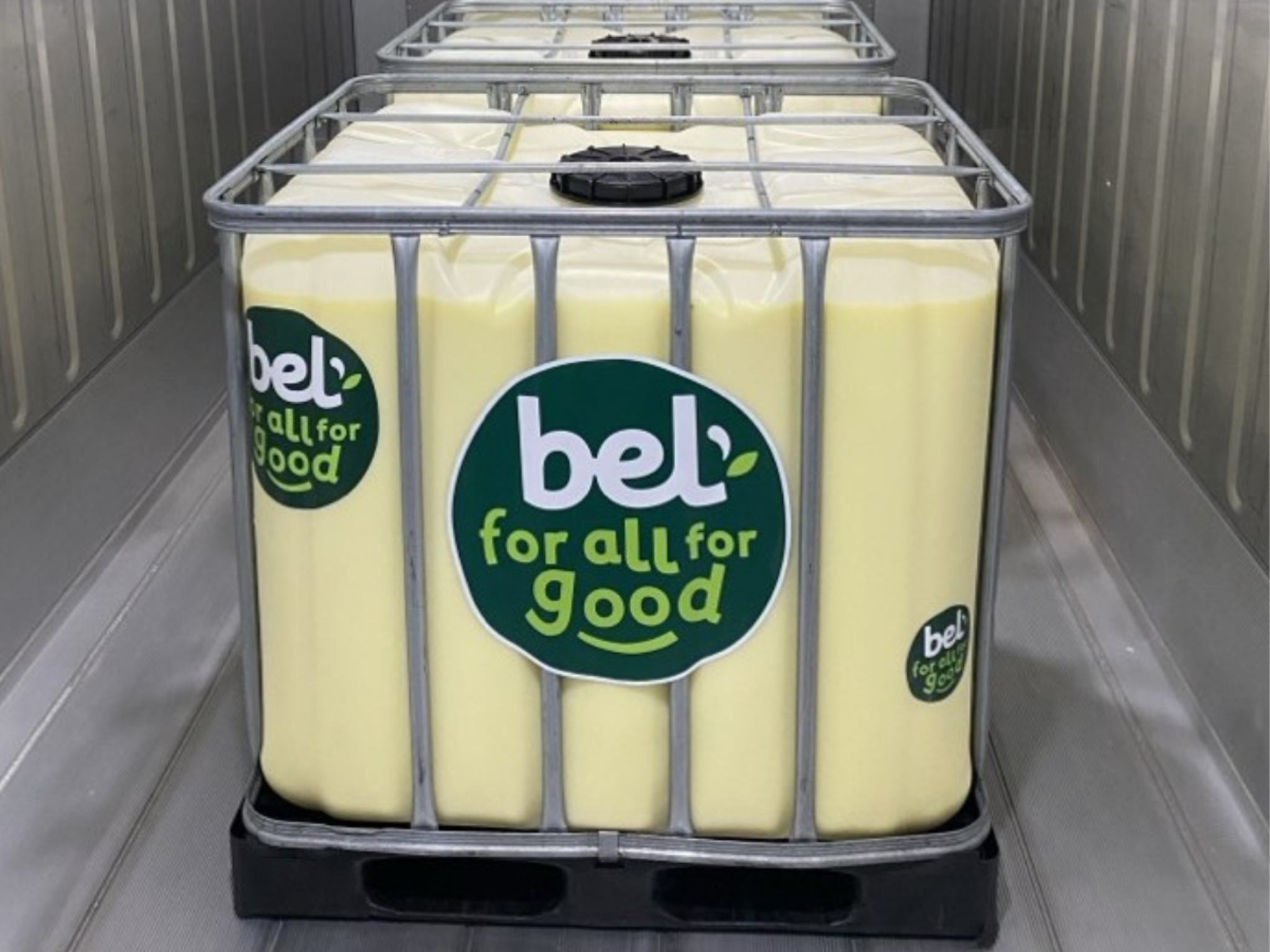
French dairy giant Bel Group and precision fermentation firm Standing Ovation have completed an industrial-scale production run of casein by upcycling dairy industry waste.
In a global first, two French companies have developed casein – the main protein found in dairy – from the industry’s biggest waste product: whey.
Bel Group, the dairy behemoth behind Babybel, The Laughing Cow, and Boursin, has teamed up with fellow French firm Standing Ovation to produce recombinant casein from whey waste at an industrial scale.
The achievement follows years of collaboration between the two companies, with Bel having invested in Standing Ovation in 2022. They announced the project to utilise Bel’s whey, a byproduct of cheesemaking, in April.
“By transforming our cheese whey into high-value proteins, we give a second life to our by-products while significantly reducing our carbon footprint,” said Caroline Sorlin, director of investments and startup collaborations at Bel Group. “This innovation shows that technological collaboration and environmental excellence can go hand in hand.”
Standing Ovation makes major industry breakthrough

Around 80-90% of milk that enters cheese manufacturing facilities ends up as whey. Globally, between 180 and 190 million tonnes of the liquid are produced annually.
While about half of this waste is processed into added-value products like whey protein, functional foods, edible films and coatings, and lactic acid, a significant amount is left unused. Whey disposal, however, is a costly process, both in terms of economics and the environment.
Its biochemical and chemical oxygen demands are much higher than wastewater, and it can pose risks to groundwater and farmland if not disposed of properly. In fact, up to 47% of cheese-derived whey is discharged into water bodies, causing pollution, ecological imbalances, and uncontrolled microbial growth. This can lead to eutrophication, reducing the oxygen available in the water and affecting aquatic life.
As companies push to accelerate their climate initiatives, the dairy industry has been looking to valorise its co-products to boost the circular economy and meet growing environmental regulations.
Standing Ovation is using precision fermentation to solve this problem. The technology involves inserting a DNA sequence into microbes to teach them to produce specific molecules upon fermentation.
The Parisian startup has used acid whey from Bel’s cheese production to turn it into high-quality casein. After an optimisation process, the initial industrial production cycles have demonstrated the efficacy of Standing Ovation’s process at scale.
The acid whey serum contains minerals, sugar (from lactose), organic acids, and very little protein. “No traces of lactose from acid serum are found in the casein powder obtained by precision fermentation using the Standing Ovation process,” Standing Ovation CEO Yvan Chardonnens told Green Queen earlier this year. Since this is a bioidentical protein, it isn’t suitable for those with dairy allergies.
Bel turns to fermentation amid plant-based cheese struggles

This approach offers some vital environmental advantages to Bel. According to an ISO-certified life-cycle assessment, Standing Ovation’s process to produce casein reduces emissions by 74%, land use by 99%, and water consumption by 68%, compared to conventional methods.
The startup notes that the industrial production demonstrates the viability of a closed-loop valorisation model, reduces waste, and also bolsters food sovereignty by leveraging available national resources.
“This industrial validation confirms the robustness of our technology and its ability to sustainably transform practices in the dairy industry. We now have a proven and replicable solution,” said Olivier Ladet, industrial director at Standing Ovation.
It also fits into Bel’s vision to achieve zero destruction of edible products and, when it is unavoidable, 100% valorisation of food waste, as well as its target of reducing scope 3 emissions by 25% by 2035 (from a 2017 baseline) and methane emissions by 30% by 2030.
“The ability to generate caseins from a co-product of traditional cheese-making represents a true technological revolution, as well as a significant step forward in our commitment to a sustainable food transition,” emphasises Anne Pitkowski, research and applications director at Bel.
The partnership with Standing Ovation comes months after the company announced it was withdrawing its Nurishh brand of dairy-free cheese by the end of the year, which will lead to the closure of its Saint-Nazaire factory and impact around 30 jobs. The decision was driven by a failure to attract new consumers and become profitable.
Instead, Bel is focusing on its core brands, each of which has non-dairy offerings, as part of its goal to generate 50% of sales from plant-based alternatives and fruit-derived offerings by 2030. It is also working with three companies on a €9M project to develop better-tasting, more nutritious vegan cheese via fermentation and ageing techniques, backed in part by the French government.
Standing Ovation said it will now look to gradually scale up production, and support other dairy producers in adopting its circular, low-carbon valorisation approach. It has already been working with Ajinomoto Foods Europe to co-manufacture its recombinant casein at its industrial-scale plant in northern France.
The post Bel, Standing Ovation Turn Whey Waste Into Recombinant Casein at Industrial Scale appeared first on Green Queen.
This post was originally published on Green Queen.